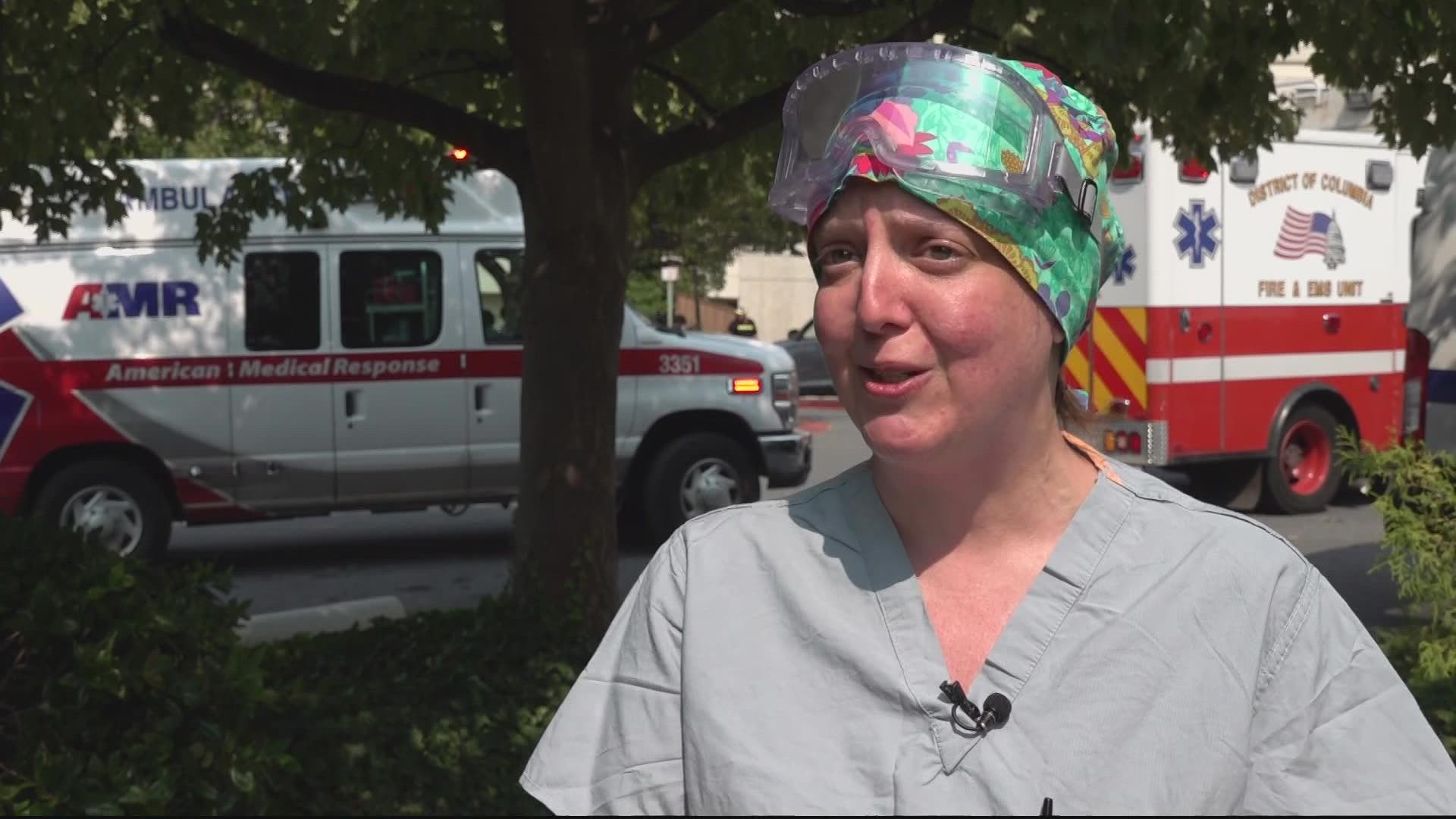WASHINGTON — It looks like help may be on the way for crime victims in D.C. A council committee just unanimously approved a sprawling bill to expand support for people who've been hurt by violence and abuse in the city.
On Friday afternoon, at least another three shootings hit the city, including one right outside the Georgia Avenue-Petworth Metro Station, where three people were hit. It was another blow in a seemingly endless cycle of violence in the city that has left even trauma surgeons struggling.
"My partner is fighting for the lives of four trauma victims that showed up in our trauma bay right now," said Dr. Erin Hall, at about 1:30 p.m. outside a packed emergency room at Medstar Washington Hospital Center.
All too often, doctors say they send victims of gun violence home alive, only to see them return weeks, months, or years later, victims of another shooting -- or perpetrators themselves.
"Revenge is powerful. But hope, I think, is more powerful," said Dr. Hall.
At Medstar, a program that connects victims with peer advocates is designed to help break the cycle of violence.
"We can find those slivers of hope and we can make them bigger. And we can make a change," Dr. Hall said.
Hospital-based violence interruption is among the programs that are part of a wide-reaching bill just approved unanimously by the DC Council's Committee on the Judiciary and Public Safety.
"It is a transformative bill for us," said Dr. Hall.
The bill creates a new crime victim counselor to guide victims through the courts and health care. It keeps their communications confidential. It gives more victims access to funds to pay for lost wages, housing, funeral, and burial costs. And it ensures D.C. police can intervene to enforce stay-away orders for victims of domestic violence.
"This is one of the single largest expansions of rights for victims and survivors of crime in D.C.," said Charles Allen, (D-DC Council, Ward 6), who is chair of the Judiciary and Public Safety Committee.
A press release from Allen's office breaks down what the bill includes as follows:
Expands victims’ eligibility to receive compensation through the Crime Victims Compensation Program
"The DC Superior Court’s Crime Victims Compensation Program helps victims and their families financially recover after certain crimes by paying for medical and counseling expenses, housing, funeral and burial costs, and lost wages.
"The bill expands the number of offenses for which victims and their families can apply, including for elder abuse and destruction of property by intimate partners or due to gunshots, following recommendations from the Crime Victims Compensation Advisory Commission.
"The bill also expands the expenses covered to include the costs of out-patient mental health counseling and raises the maximum compensation available for families with children.
"Lastly, the bill eases the burden on victims by establishing a more flexible application process."
Hands-On Support for Victims and Protecting their Privacy
"Creates a new crime victim counselor to help guide victims through their legal options, health care, counseling, and in a time of crisis
"Formalizes the role of hospital-based violence intervention programs (“HVIPs) and their staff already operating in regional hospitals
"Protects confidential communications between victims and crime victim counselors or hospital-based violence intervention program members to provide victims of crime with trusted advocates
"Expands confidentiality between victims and existing counselor roles, including domestic violence human trafficking, and sexual assault counselors.
"Expands the District’s Address Confidentiality Program, so that participants who are also government employees don’t have their personal information disclosed. The Address Confidentiality Program provides a substitute address in public records for residents who may fear for their safety, shielding their real address from being disclosed."
Expands Services of the District’s Hospital-Based Violence Intervention Program (HVIP)
"HVIPs serve primarily victims of serious crimes who come to the emergency room with gunshot or stabbing wounds. They respond quickly to potential escalation, establish trust and credibility, connect victims to resources and opportunities in their communities, and victims’ confidential communication with them is protected
"In addition to formalizing HVIPs in law, the legislation establishes the right of HVIP members to be present in medical exams and interviews with police with the consent of victims.
"Establishes a two-year pilot program to develop evidence-based policies, protocols, and training for hospital staff, medical providers, and law enforcement to guide their interactions when operating as part of a hospital-based violence intervention program. The Committee identified $500,000 for this pilot in the FY23 budget.
"Creates a long-term task force comprised of representatives from District agencies, area hospitals, and District residents to analyze outcomes for patients served by hospital-based violence intervention programs and propose policies that should be adopted by hospitals or District agencies to improve patient outcomes."
Creates a New Crime when a Stay Away Order is Violated to Give MPD the Ability to Intervene Faster
"In order to ensure MPD has the tools available to intervene immediately if someone is violating a stay away order and that the U.S. Attorney’s Office can prosecute, the bill creates a new crime for violating a post-conviction stay-away or no-contact order"
Additionally, the bill will also:
"Close a loophole in the District’s criminal law to ensure any sexual conduct by law enforcement officers with arrestees or detainees is clearly criminalized;
"Prohibit the execution of arrest warrants on sexual assault victims and victims of serious violent injuries while they’re seeking emergency medical treatment or medical forensic care; and
"Create a private right of action for injunctive relief for sexual assault victims when their rights under District law are violated, as there currently is no enforcement mechanism."
The bill now goes to the full council, where ten members have already signed on. The next vote is expected on October 4.
WATCH NEXT: 'A risk to the community' | Sniper Lee Boyd Malvo's parole request denied by Virginia Board
The Virginia Parole Board has denied Sniper Lee Boyd Malvo's parole request while he is serving four life sentences.

